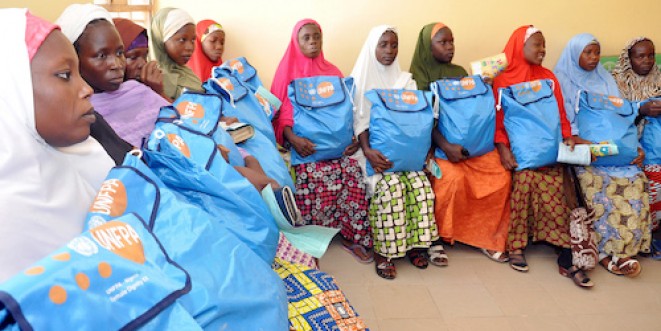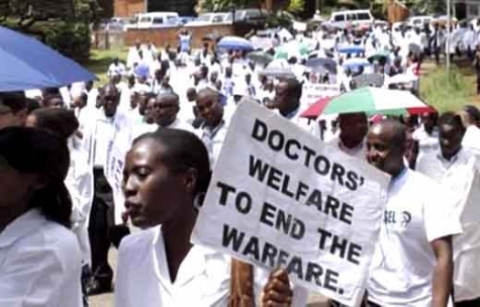Distribution of 22,000 Abortifacient Kits to Displaced Nigerian Women And Other Stories in This Week’s News Roundup
By Radiant HealthPublished: April 8, 2016

What the Nigerian Health Minister Has to Say
Professor Isaac Adewole, the Health Minister, had a busy week addressing forums on the state of healthcare in the country. And, by all accounts, he does have a lot on his plate.
For a start, Professor Adewole reiterated that treatment must be given to save lives before asking for payment. As he pointed out, accidents can happen at any time; people don’t prepare for the cases that bring them into A&E. On another day, the Health Minister lamented the number of Nigerians traveling overseas for treatments that can be handled inside the country’s borders; Professor Adewole said that doctors referring patients using government funds outside of Nigeria (when it is possible to treat them internally) will be sanctioned. He also endorsed local production of mosquito nets and other medicines that can be produced in Nigeria. According to his statements, the country is spending millions on importing items that could be made locally.
Hopefully, all of these initiatives will be realised before we know it, but there’s a lot of work to do as the minister’s schedule should suggest.
***
Impending Medical Strikes Threaten Health Care… Again
On April 4, the National Association of Resident Doctors (NARD) issued an ultimatum to the government. They’re demanding full back-pay for doctors, the upgrade of facilities across the country, the reversal of status for sacked doctors, and the abolition of “no work no pay”. If the government hasn’t taken action by April 25, members of the NARD will strike indefinitely.
That’s a tough order for any country, and this one’s laced with threats that compromise the government’s ability to effect lasting changes in this area. While doctors are definitely entitled to remuneration for work undertaken, it’s not hard to see why the government plans to stand by its policy of “no work no pay”.
***
If You Work in an Office, You Need to Read This Now
It’s little wonder that the health of office workers suffers unduly from long periods behind a desk. Sedentary lifestyles contribute to poor health overall and may lead to diabetes and heart diseases. But what can you do about it? You need to work, right?
According to researchers at the University of Leicester in the United Kingdom, a moderate amount of exercise can counter the severe effects of almost constant sitting. And, that’s a really moderate amount; research suggests that you need a mere two and a half hours a week. Isn’t it time you got off your butt?
***
What Will We Do About the Children?
In Nigeria, a shocking number of children under five die from pneumonia and diarrhoea every year. According to the Civil Society Legislative Advocacy Centre (CISLAC), 201,000 children succumb to diarrhoea while 277,000 children pass as a result of pneumonia. That’s an enormous number of deaths attributed to treatable diseases.
These conditions are often preventable through increased nutritional understanding and the availability of foods throughout the country. Nutritional advancement does require a budget, but there is a plan laid out in government already – the National Strategic Plan of Action on Nutrition. Perhaps it’s time to bend the ears of your representatives to ensure this plan receives budget and is passed into legal frameworks?
***
Is It a Good Thing or a Bad Thing?
Twenty-two thousand abortifacient kits have been delivered to displaced women throughout the war-ravaged areas of Nigeria. Using the name “dignity kits”, these medical packs were supplied by the United States Agency for International Development (USAID) and the United Nations Population Fund (UNFPA).
Not sure what abortifacient kits are? They’re birth control tablets along with personal toiletries and a set of clean clothes. And yes, they’re as controversial as you think they would be. We expect we’ll be hearing a great deal more about this in coming weeks.
***
The Nutrition Mistakes You’re Still Making
There are so many diets out there and so much conflicting advice about what you should and should not be eating. A few years ago, you were warned to stay away from fat, and then it was carbs.
How are you supposed to know what’s true or false when the nutritional community is at odds with itself? Your best bet is to maintain a balanced diet filled with as many fruits and vegetables as possible. If you have a medically diagnosed condition, a lasting feeling of malaise, or you’re overweight, then you should consult with a reputable nutritionist or your GP. In the meantime, take a look at these common misconceptions.
***
Lassa Fever Takes Its Toll in Nigeria
Since November 2015, Lassa Fever has claimed the lives of 167 people in West Africa. One hundred and thirty-eight of those deaths occurred in Nigeria, along with the greatest number of infected people. According to medical authorities, high mortality rates stems from the inability to test quickly for the presence of this condition.
Without tests, it’s important to understand the symptoms of Lassa Fever. Infected persons experience weakness and general discomfort followed by headaches, muscular pains, nausea and vomiting, then diarrhoea and abdominal pain. Symptoms can present themselves anywhere between six days and three weeks after infection.
***
What’s Wrong with Gender Equality?
If you’re a Nigerian woman anywhere in the world, you can’t have missed the parliamentary veto of the gender equality bill last month. Women across the world heard the news in shock and horror as the government resorted to out-of-date excuses to provide women with equal rights to men. They called for parliament to reconsider the bill.
Now, activist groups are sprinkling salt on the wound. The Foundation for African Cultural Heritage (FACH), a coalition of groups, is against the passing of this bill into law. According to the Director, Mrs. Nkechi Asogwa, the provisions of the bill promote “abrasive western liberation of women, gay practices, legalisation of abortion and gender stereotyping….”
If you’re concerned about the state of gender equality in Nigeria, why not take a few minutes to sign this petition.
Like what you're reading? Sign up for our free newsletter and never miss a post! Plus get a FREE digital version of our Issue No.10 with sign up.

- Some Americans Will Have Medical Debt Wiped From Credit - July 9, 2022
- Natural Gas Used to Heat Homes Contains Some Harmful Chemicals - July 9, 2022
- Uterine Cancer Claims Many Black Lives - July 9, 2022
- Babies and Toddlers Get COVID-19 Shots - June 27, 2022
- FDA Bans Juul’s E-Cigarettes and Cartridges - June 27, 2022
- Polio Virus Found in London Sewage - June 27, 2022
- 200 Million Americans Are Drinking Contaminated Water - June 19, 2022
- Young Kids Can Finally Get Vaccinated Against COVID-19 - June 19, 2022
- New Regulations for Baby Sleep Products - June 19, 2022
- FDA Approves First Drug for Alopecia Hair Loss - June 19, 2022














